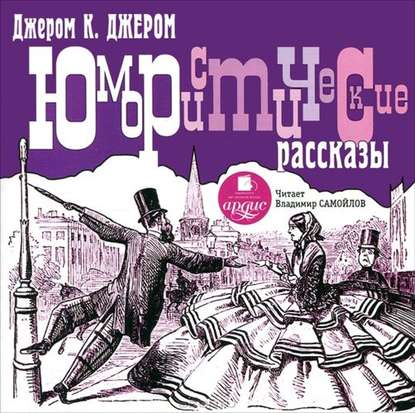 Полная версия
Полная версияПолная версия:
Джером Клапка Джером Idle Ideas in 1905
- + Увеличить шрифт
- - Уменьшить шрифт

Jerome K. Jerome
Idle Ideas in 1905
ARE WE AS INTERESTING AS WE THINK WE ARE?
“Charmed. Very hot weather we’ve been having of late – I mean cold. Let me see, I did not quite catch your name just now. Thank you so much. Yes, it is a bit close.” And a silence falls, neither of us being able to think what next to say.
What has happened is this: My host has met me in the doorway, and shaken me heartily by the hand.
“So glad you were able to come,” he has said. “Some friends of mine here, very anxious to meet you.” He has bustled me across the room. “Delightful people. You’ll like them – have read all your books.”
He has brought me up to a stately lady, and has presented me. We have exchanged the customary commonplaces, and she, I feel, is waiting for me to say something clever, original and tactful. And I don’t know whether she is Presbyterian or Mormon; a Protectionist or a Free Trader; whether she is engaged to be married or has lately been divorced!
A friend of mine adopts the sensible plan of always providing you with a short history of the person to whom he is about to lead you.
“I want to introduce you to a Mrs. Jones,” he whispers. “Clever woman. Wrote a book two years ago. Forget the name of it. Something about twins. Keep away from sausages. Father ran a pork shop in the Borough. Husband on the Stock Exchange. Keep off coke. Unpleasantness about a company. You’ll get on best by sticking to the book. Lot in it about platonic friendship. Don’t seem to be looking too closely at her. Has a slight squint she tries to hide.”
By this time we have reached the lady, and he introduces me as a friend of his who is simply dying to know her.
“Wants to talk about your book,” he explains. “Disagrees with you entirely on the subject of platonic friendship. Sure you’ll be able to convince him.”
It saves us both a deal of trouble. I start at once on platonic friendship, and ask her questions about twins, avoiding sausages and coke. She thinks me an unusually interesting man, and I am less bored than otherwise I might be.
I have sometimes thought it would be a serviceable device if, in Society, we all of us wore a neat card – pinned, say, upon our back – setting forth such information as was necessary; our name legibly written, and how to be pronounced; our age (not necessarily in good faith, but for purposes of conversation. Once I seriously hurt a German lady by demanding of her information about the Franco-German war. She looked to me as if she could not object to being taken for forty. It turned out she was thirty-seven. Had I not been an Englishman I might have had to fight a duel); our religious and political beliefs; together with a list of the subjects we were most at home upon; and a few facts concerning our career – sufficient to save the stranger from, what is vulgarly termed “putting his foot in it.” Before making jokes about “Dumping,” or discussing the question of Chinese Cheap Labour, one would glance behind and note whether one’s companion was ticketed “Whole-hogger,” or “Pro-Boer.” Guests desirous of agreeable partners – an “agreeable person,” according to the late Lord Beaconsfield’s definition, being “a person who agrees with you” – could make their own selection.
“Excuse me. Would you mind turning round a minute? Ah, ‘Wagnerian Crank!’ I am afraid we should not get on together. I prefer the Italian school.”
Or, “How delightful. I see you don’t believe in vaccination. May I take you into supper?”
Those, on the other hand, fond of argument would choose a suitable opponent. A master of ceremonies might be provided who would stand in the centre of the room and call for partners: “Lady with strong views in favour of female franchise wishes to meet gentleman holding the opinions of St. Paul. With view to argument.”
An American lady, a year or two ago, wrote me a letter that did me real good: she appreciated my work with so much understanding, criticised it with such sympathetic interest. She added that, when in England the summer before, she had been on the point of accepting an invitation to meet me; but at the last moment she had changed her mind; she felt so sure – she put it pleasantly, but this is what it came to – that in my own proper person I should fall short of her expectations. For my own sake I felt sorry she had cried off; it would have been worth something to have met so sensible a woman. An author introduced to people who have read – or who say that they have read – his books, feels always like a man taken for the first time to be shown to his future wife’s relations. They are very pleasant. They try to put him at his ease. But he knows instinctively they are disappointed with him. I remember, when a very young man, attending a party at which a famous American humorist was the chief guest. I was standing close behind a lady who was talking to her husband.
“He doesn’t look a bit funny,” said the lady.
“Great Scott!” answered her husband. “How did you expect him to look? Did you think he would have a red nose and a patch over one eye?”
“Oh, well, he might look funnier than that, anyhow,” retorted the lady, highly dissatisfied. “It isn’t worth coming for.”
We all know the story of the hostess who, leaning across the table during the dessert, requested of the funny man that he would kindly say something amusing soon, because the dear children were waiting to go to bed. Children, I suppose, have no use for funny people who don’t choose to be funny. I once invited a friend down to my house for a Saturday to Monday. He is an entertaining man, and before he came I dilated on his powers of humour – somewhat foolishly perhaps – in the presence of a certain youthful person who resides with me, and who listens when she oughtn’t to, and never when she ought. He happened not to be in a humorous mood that evening. My young relation, after dinner, climbed upon my knee. For quite five minutes she sat silent. Then she whispered:
“Has he said anything funny?”
“Hush. No, not yet; don’t be silly.”
Five minutes later: “Was that funny?”
“No, of course not.”
“Why not?”
“Because – can’t you hear? We are talking about Old Age Pensions.”
“What’s that?”
“Oh, it’s – oh, never mind now. It isn’t a subject on which one can be funny.”
“Then what’s he want to talk about it for?”
She waited for another quarter of an hour. Then, evidently bored, and much to my relief, suggested herself that she might as well go to bed. She ran to me the next morning in the garden with an air of triumph.
“He said something so funny last night,” she told me.
“Oh, what was it?” I inquired. It seemed to me I must have missed it.
“Well, I can’t exactly ’member it,” she explained, “not just at the moment. But it was so funny. I dreamed it, you know.”
For folks not Lions, but closely related to Lions, introductions must be trying ordeals. You tell them that for years you have been yearning to meet them. You assure them, in a voice trembling with emotion, that this is indeed a privilege. You go on to add that when a boy —
At this point they have to interrupt you to explain that they are not the Mr. So-and-So, but only his cousin or his grandfather; and all you can think of to say is: “Oh, I’m so sorry.”
I had a nephew who was once the amateur long-distance bicycle champion. I have him still, but he is stouter and has come down to a motor car. In sporting circles I was always introduced as “Shorland’s Uncle.” Close-cropped young men would gaze at me with rapture; and then inquire: “And do you do anything yourself, Mr. Jerome?”
But my case was not so bad as that of a friend of mine, a doctor. He married a leading actress, and was known ever afterwards as “Miss B – ’s husband.”
At public dinners, where one takes one’s seat for the evening next to someone that one possibly has never met before, and is never likely to meet again, conversation is difficult and dangerous. I remember talking to a lady at a Vagabond Club dinner. She asked me during the entree– with a light laugh, as I afterwards recalled – what I thought, candidly, of the last book of a certain celebrated authoress. I told her, and a coldness sprang up between us. She happened to be the certain celebrated authoress; she had changed her place at the last moment so as to avoid sitting next to another lady novelist, whom she hated.
One has to shift oneself, sometimes, on these occasions. A newspaper man came up to me last Ninth of November at the Mansion House.
“Would you mind changing seats with me?” he asked. “It’s a bit awkward. They’ve put me next to my first wife.”
I had a troubled evening myself once long ago. I accompanied a young widow lady to a musical At Home, given by a lady who had more acquaintances than she knew. We met the butler at the top of the stairs. My friend spoke first:
“Say Mrs. Dash and – ”
The butler did not wait for more – he was a youngish man – but shouted out:
“Mr. and Mrs. Dash.”
“My dear! how very quiet you have kept!” cried our hostess delighted. “Do let me congratulate you.”
The crush was too great and our hostess too distracted at the moment for any explanations. We were swept away, and both of us spent the remainder of the evening feebly protesting our singleness.
If it had happened on the stage it would have taken us the whole play to get out of it. Stage people are not allowed to put things right when mistakes are made with their identity. If the light comedian is expecting a plumber, the first man that comes into the drawing-room has got to be a plumber. He is not allowed to point out that he never was a plumber; that he doesn’t look like a plumber; that no one not an idiot would mistake him for a plumber. He has got to be shut up in the bath-room and have water poured over him, just as if he were a plumber – a stage plumber, that is. Not till right away at the end of the last act is he permitted to remark that he happens to be the new curate.
I sat out a play once at which most people laughed. It made me sad. A dear old lady entered towards the end of the first act. We knew she was the aunt. Nobody can possibly mistake the stage aunt – except the people on the stage. They, of course, mistook her for a circus rider, and shut her up in a cupboard. It is what cupboards seem to be reserved for on the stage. Nothing is ever put in them excepting the hero’s relations. When she wasn’t in the cupboard she was in a clothes basket, or tied up in a curtain. All she need have done was to hold on to something while remarking to the hero:
“If you’ll stop shouting and jumping about for just ten seconds, and give me a chance to observe that I am your maiden aunt from Devonshire, all this tomfoolery can be avoided.”
That would have ended it. As a matter of fact that did end it five minutes past eleven. It hadn’t occurred to her to say it before.
In real life I never knew but of one case where a man suffered in silence unpleasantness he could have ended with a word; and that was the case of the late Corney Grain. He had been engaged to give his entertainment at a country house. The lady was a nouvelle riche of snobbish instincts. She left instructions that Corney Grain when he arrived was to dine with the servants. The butler, who knew better, apologised; but Corney was a man not easily disconcerted. He dined well, and after dinner rose and addressed the assembled company.
“Well, now, my good friends,” said Corney, “if we have all finished, and if you are all agreeable, I shall be pleased to present to you my little show.”
The servants cheered. The piano was dispensed with. Corney contrived to amuse his audience very well for half-an-hour without it. At ten o’clock came down a message: Would Mr. Corney Grain come up into the drawing-room. Corney went. The company in the drawing-room were waiting, seated.
“We are ready, Mr. Grain,” remarked the hostess.
“Ready for what?” demanded Corney.
“For your entertainment,” answered the hostess.
“But I have given it already,” explained Corney; “and my engagement was for one performance only.”
“Given it! Where? When?”
“An hour ago, downstairs.”
“But this is nonsense,” exclaimed the hostess.
“It seemed to me somewhat unusual,” Corney replied; “but it has always been my privilege to dine with the company I am asked to entertain. I took it you had arranged a little treat for the servants.”
And Corney left to catch his train.
Another entertainer told me the following story, although a joke against himself. He and Corney Grain were sharing a cottage on the river. A man called early one morning to discuss affairs, and was talking to Corney in the parlour, which was on the ground floor. The window was open. The other entertainer – the man who told me the story – was dressing in the room above. Thinking he recognised the voice of the visitor below, he leant out of his bedroom window to hear better. He leant too far, and dived head foremost into a bed of flowers, his bare legs – and only his bare legs – showing through the open window of the parlour.
“Good gracious!” exclaimed the visitor, turning at the moment and seeing a pair of wriggling legs above the window sill; “who’s that?”
Corney fixed his eyeglass and strolled to the window.
“Oh, it’s only What’s-his-name,” he explained. “Wonderful spirits. Can be funny in the morning.”
SHOULD WOMEN BE BEAUTIFUL?
Pretty women are going to have a hard time of it later on. Hitherto, they have had things far too much their own way. In the future there are going to be no pretty girls, for the simple reason there will be no plain girls against which to contrast them. Of late I have done some systematic reading of ladies’ papers. The plain girl submits to a course of “treatment.” In eighteen months she bursts upon Society an acknowledged beauty. And it is all done by kindness. One girl writes:
“Only a little while ago I used to look at myself in the glass and cry. Now I look at myself and laugh.”
The letter is accompanied by two photographs of the young lady. I should have cried myself had I seen her as she was at first. She was a stumpy, flat-headed, squat-nosed, cross-eyed thing. She did not even look good. One virtue she appears to have had, however. It was faith. She believed what the label said, she did what the label told her. She is now a tall, ravishing young person, her only trouble being, I should say, to know what to do with her hair – it reaches to her knees and must be a nuisance to her. She would do better to give some of it away. Taking this young lady as a text, it means that the girl who declines to be a dream of loveliness does so out of obstinacy. What the raw material may be does not appear to matter. Provided no feature is absolutely missing, the result is one and the same.
Arrived at years of discretion, the maiden proceeds to choose the style of beauty she prefers. Will she be a Juno, a Venus, or a Helen? Will she have a Grecian nose, or one tip-tilted like the petal of a rose? Let her try the tip-tilted style first. The professor has an idea it is going to be fashionable. If afterwards she does not like it, there will be time to try the Grecian. It is difficult to decide these points without experiment.
Would the lady like a high or a low forehead? Some ladies like to look intelligent. It is purely a matter of taste. With the Grecian nose, the low broad forehead perhaps goes better. It is more according to precedent. On the other hand, the high brainy forehead would be more original. It is for the lady herself to select.
We come to the question of eyes. The lady fancies a delicate blue, not too pronounced a colour – one of those useful shades that go with almost everything. At the same time there should be depth and passion. The professor understands exactly the sort of eye the lady means. But it will be expensive. There is a cheap quality; the professor does not recommend it. True that it passes muster by gaslight, but the sunlight shows it up. It lacks tenderness, and at the price you can hardly expect it to contain much hidden meaning. The professor advises the melting, Oh-George-take-me-in-your-arms-and-still-my-foolish-fears brand. It costs a little more, but it pays for itself in the end.
Perhaps it will be best, now the eye has been fixed upon, to discuss the question of the hair. The professor opens his book of patterns. Maybe the lady is of a wilful disposition. She loves to run laughing through the woods during exceptionally rainy weather; or to gallop across the downs without a hat, her fair ringlets streaming in the wind, the old family coachman panting and expostulating in the rear. If one may trust the popular novel, extremely satisfactory husbands have often been secured in this way. You naturally look at a girl who is walking through a wood, laughing heartily apparently for no other reason than because it is raining – who rides at stretch gallop without a hat. If you have nothing else to do, you follow her. It is always on the cards that such a girl may do something really amusing before she gets home. Thus things begin.
To a girl of this kind, naturally curly hair is essential. It must be the sort of hair that looks better when it is soaking wet. The bottle of stuff that makes this particular hair to grow may be considered dear, if you think merely of the price. But that is not the way to look at it. “What is it going to do for me?” That is what the girl has got to ask herself. It does not do to spoil the ship for a ha’porth of tar, as the saying is. If you are going to be a dashing, wilful beauty, you must have the hair for it, or the whole scheme falls to the ground.
Eyebrows and eyelashes, the professor assumes, the lady would like to match the hair. Too much eccentricity the professor does not agree with. Nature, after all, is the best guide; neatness combined with taste, that is the ideal to be aimed at. The eyebrows should be almost straight, the professor thinks; the eyelashes long and silky, with just the suspicion of a curl. The professor would also suggest a little less cheekbone. Cheekbones are being worn low this season.
Will the lady have a dimpled chin, or does she fancy the square-cut jaw? Maybe the square-cut jaw and the firm, sweet mouth are more suitable for the married woman. They go well enough with the baby and the tea-urn, and the strong, proud man in the background. For the unmarried girl the dimpled chin and the rosebud mouth are, perhaps, on the whole safer. Some gentlemen are so nervous of that firm, square jaw. For the present, at all events, let us keep to the rosebud and the dimple.
Complexion! Well, there is only one complexion worth considering – a creamy white, relieved by delicate peach pink. It goes with everything, and is always effective. Rich olives, striking pallors – yes, you hear of these things doing well. The professor’s experience, however, is that for all-round work you will never improve upon the plain white and pink. It is less liable to get out of order, and is the easiest at all times to renew.
For the figure, the professor recommends something lithe and supple. Five foot four is a good height, but that is a point that should be discussed first with the dressmaker. For trains, five foot six is, perhaps, preferable. But for the sporting girl, who has to wear short frocks, that height would, of course, be impossible.
The bust and the waist are also points on which the dressmaker should be consulted. Nothing should be done in a hurry. What is the fashion going to be for the next two or three seasons? There are styles demanding that beginning at the neck you should curve out, like a pouter pigeon. There is apparently no difficulty whatever in obtaining this result. But if crinolines, for instance, are likely to come in again! The lady has only to imagine it for herself: the effect might be grotesque, suggestive of a walking hour-glass. So, too, with the waist. For some fashions it is better to have it just a foot from the neck. At other times it is more useful lower down. The lady will kindly think over these details and let the professor know. While one is about it, one may as well make a sound job.
It is all so simple, and, when you come to think of it, really not expensive. Age, apparently, makes no difference. A woman is as old as she looks. In future, I take it, there will be no ladies over five-and-twenty. Wrinkles! Why any lady should still persist in wearing them is a mystery to me. With a moderate amount of care any middle-class woman could save enough out of the housekeeping money in a month to get rid of every one of them. Grey hair! Well, of course, if you cling to grey hair, there is no more to be said. But to ladies who would just as soon have rich wavy-brown or a delicate shade of gold, I would point out that there are one hundred and forty-seven inexpensive lotions on the market, any one of which, rubbed gently into the head with a tooth-brush (not too hard) just before going to bed will, to use a colloquialism, do the trick.
Are you too stout, or are you too thin? All you have to do is to say which, and enclose stamps. But do not make a mistake and send for the wrong recipe. If you are already too thin, you might in consequence suddenly disappear before you found out your mistake. One very stout lady I knew worked at herself for eighteen months and got stouter every day. This discouraged her so much that she gave up trying. No doubt she had made a muddle and had sent for the wrong bottle, but she would not listen to further advice. She said she was tired of the whole thing.
In future years there will be no need for a young man to look about him for a wife; he will take the nearest girl, tell her his ideal, and, if she really care for him, she will go to the shop and have herself fixed up to his pattern. In certain Eastern countries, I believe, something of this kind is done. A gentleman desirous of adding to his family sends round the neighbourhood the weight and size of his favourite wife, hinting that if another can be found of the same proportions, there is room for her. Fathers walk round among their daughters, choose the most likely specimen, and have her fattened up. That is their brutal Eastern way. Out West we shall be more delicate. Match-making mothers will probably revive the old confession book. Eligible bachelors will be invited to fill in a page: “Your favourite height in women,” “Your favourite measurement round the waist,” “Do you like brunettes or blondes?”
The choice will be left to the girls.
“I do think Henry William just too sweet for words,” the maiden of the future will murmur to herself. Gently, coyly, she will draw from him his ideal of what a woman should be. In from six months to a year she will burst upon him, the perfect She; height, size, weight, right to a T. He will clasp her in his arms.
“At last,” he will cry, “I have found her, the woman of my dreams.”
And if he does not change his mind, and the bottles do not begin to lose their effect, there will be every chance that they will be happy ever afterwards.
Might not Science go even further? Why rest satisfied with making a world of merely beautiful women? Cannot Science, while she is about it, make them all good at the same time. I do not apologise for the suggestion. I used to think all women beautiful and good. It is their own papers that have disillusioned me. I used to look at this lady or at that – shyly, when nobody seemed to be noticing me – and think how fair she was, how stately. Now I only wonder who is her chemist.
They used to tell me, when I was a little boy, that girls were made of sugar and spice. I know better now. I have read the recipes in the Answers to Correspondents.
When I was quite a young man I used to sit in dark corners and listen, with swelling heart, while people at the piano told me where little girl babies got their wonderful eyes from, of the things they did to them in heaven that gave them dimples. Ah me! I wish now I had never come across those ladies’ papers. I know the stuff that causes those bewitching eyes. I know the shop where they make those dimples; I have passed it and looked in. I thought they were produced by angels’ kisses, but there was not an angel about the place, that I could see. Perhaps I have also been deceived as regards their goodness. Maybe all women are not so perfect as in the popular short story they appear to be. That is why I suggest that Science should proceed still further, and make them all as beautiful in mind as she is now able to make them in body. May we not live to see in the advertisement columns of the ladies’ paper of the future the portrait of a young girl sulking in a corner – “Before taking the lotion!” The same girl dancing among her little brothers and sisters, shedding sunlight through the home – “After the three first bottles!” May we not have the Caudle Mixture: One tablespoonful at bed-time guaranteed to make the lady murmur, “Good-night, dear; hope you’ll sleep well,” and at once to fall asleep, her lips parted in a smile? Maybe some specialist of the future will advertise Mind Massage: “Warranted to remove from the most obstinate subject all traces of hatred, envy, and malice.”







